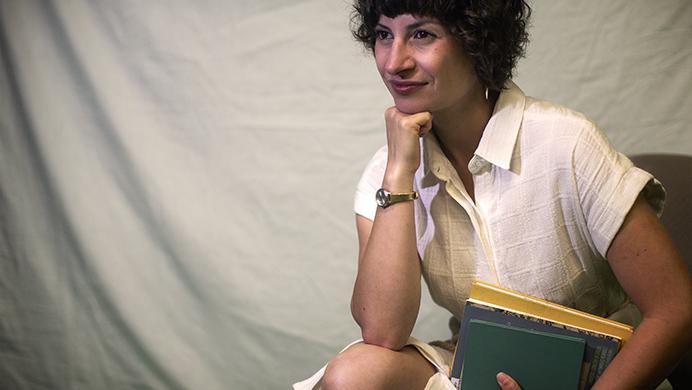Morocco calls UI alumna
A Fulbright winner will take her husband and cat along to Morocco.
The Daily Iowan; Photos by Ben S
Hodna Nuernberg, recipient of the Fulbright English Teaching Assistant Award, poses for a portrait inside the Daily Iowan TV studio on Tuesday, June 20. Nuernberg drew parallels between her work and the work of Junot Diaz, a Dominican American writer whose multilingual background, Nuernberg draws inspiration from. She will be moving to Morocco to pursue a career in teaching university students the English language. (Ben Smith/The Daily Iowan)
July 4, 2017
For a University of Iowa graduate, choosing which Fulbright program to apply for, and where, was easy. Now that she is ready for departure in September, she must prepare to teach others while learning the Moroccan culture.
Hodna Nuernberg is used to traveling. Since she was a kid, her mother, father, and sister moved around the United States and France.
Nuernberg followed until she was 15 years old and landed in Iowa City. She graduated from a nearby boarding school, traveled a little bit in between, but always called Iowa City home, even after her family moved away.
Now, she lives only three blocks away from where she lived when she was a teen. This time, she lives with her husband, Paul Schneeberger, and an adopted cat, Beppo.
They won’t be there much longer, though, because Nuernberg has won a Fulbright English Teaching Assistant Award. Together, the three will pack up and move to Morocco, the North African country west of Algeria and south of Spain.
Starting in September, Nuernberg will teach English at a public university in Morocco to a group of students who want to become teachers themselves.
Nuernberg said she believes Morocco is a good fit for her, culturally. She wanted to go somewhere Arabic-speaking so she can add Modern Standard Arabic and Darija to her list of known languages — English and French.
She’s familiar with Darija — the spoken dialects of Arabic used in the Maghreb (the region of North Africa that includes Morocco, Algeria, Tunisia, and sometimes Libya) — because her father is from Algeria and grew up speaking that, though didn’t speak it in the house when she was growing up.
As part of preparing to teach in Morocco, Nuernberg looks for inspiration by recognizing American author Junot Diaz, a Pulitzer-Prize winner and activist who was born in the Dominican Republic and grew up in New Jersey.
“[Diaz is] really writing the way he and his community members speak, which is like a Creolized language that mixes different things,” Nuernberg said. “And I think that’s really interesting to think in the context of North Africa with its history, and the colonial history, and the question of language.
“There’s this richness of language that’s so specific to that place. I think there are parallels with Junot Diaz.”
Teaching in Morocco won’t be the first experience Nuernberg will have abroad.
She taught English at the University of Poitiers in France as part of a teaching-exchange program while she was a graduate student in the French Department.
Other notches in her UI belt include a B.A in French and Arabic, M.A in Francophone World Studies, and M.F.A in Literary Translation.
After graduation, Nuernberg was a provost post-graduate visiting writer in literary translation as part of a fellowship, and in that role she taught in English Department’s creative writing track for undergrads.
“If you think about it in a broader perspective, she’s taking many of the goals of the writing programs at the University of Iowa, and she’s going to be taking all that she learned and all the ideas about them, and she’s going to be putting them to practice in her own way in different parts of the country,” said UI Fulbright Program Adviser Karen Wachsmuth.
Among many things, Nuernberg is excited to represent the U.S. as an “unofficial citizen diplomat” in her role as a Fulbright winner.
“… It certainly is your role there to promote mutual understanding and cultural exchange,” she said. “And I accept that. I think it’s a really important thing to do as a private citizen and to show … America is varied and diverse.”
Those who know her at the UI say Nuernberg’s actions make her well-suited for the position.
One of Nuernberg’s instructors and aide in the Fulbright application process, is Natasa Durovicova, an editor in the UI International Writing Program and a faculty member in M.F.A in Literary Translation.
“One of the rubrics on the Fulbright application is ‘Will this person represent United States well?’ And I think Hodna is just a great example of a combination of somebody who really is a can-do person, which is the great American skill,” Durovicova said. “People who are just pragmatic, people who just go [to the country] and solve problems.”
Traveling to Morocco and living there is no small feat. Luckily for Nuernberg, her travel costs are covered by the Fulbright. She also gets $650 for baggage fees, there and back. Then, she’ll receive a monthly stipend between $1,000 and $1,500, she said, depending on what the country decides.
Also, she said she will be given $2,500 for language instruction on the side, upon approval for tutor or program of choice.
“The idea is, it’s enough to live, but you should be living — not completely, but — more along the lines of how people in that country live,” Nuernberg said. “Really making quite a bit more than the country’s average, but working alongside academic peers, they might align closer to what those wages are.”
Prior to departure, Nuernberg has been getting vaccinations and thinking about lesson plans.
But unlike technology-driven resources one might use to rent an apartment in the U.S., Nuernberg and her husband will look for that (and a litter box) upon arrival.
They will go to a “hanout,” or corner shop that sells water bottles, peanuts, etc., and trust the locals by word-of-mouth.



